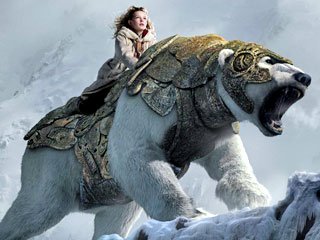No Lions, No Christians, Just a Bear: The Golden Compass
by George Sax

Somewhere during the first half of Chris Weitz’s filmed version of Phillip Pullman’s young-adult novel Northern Lights (titled The Golden Compass in the U.S.), a character who’s been speaking of mysterious, mindboggling things is asked, “How can you know such things?” and he replies, “From the witches.”
At that point, someone watching the movie could easily be excused for wishing for a few witches to explain things, although even if there were some available it might not help much. By then, Weitz, who both wrote and directed, has already imposed too many obscure details and murky plot devices, and he goes on doing this for much of the rest of his movie.
Eventually, Kristin Scott Thomas turns up as a flying witch (sans broom), looking a lot more like Thomas Malory’s Morgan LeFay than Margaret Hamilton in The Wizard of Oz, and leading an airborne army of sisters. They’re just another of the various last-minute rescuers that the movie relies on. The effect of all this is numbingly complex rather than inventively charming, exciting or imaginatively evocative like the best cinematic fantasy adventures, The Lord of the Rings trilogy being the current touchstone.
The Golden Compass actually signals its problems at the very start when a short voiceover prologue seems to cram a lot of important backstory and context into a few words, mostly about “worlds parallel to each other, other earths” and some kind of primal “dust” which “connects them all.” This dust, as it happens, is crucial to what is going to happen, but neither it nor the movie’s important incidents ever make even fairy-tale sense. (Perhaps I should say, they especially don’t make fairy-tale sense.)
I’m willing to believe that Pullman’s novel—the first in a trilogy—is a worthier creation, meriting its popularity in Great Britain, where it was originally published. It’s reportedly more than a story of fantastic heroic exploits. Pullman is said to have tried to write a book for adolescents containing some serious intellectual content, a story with an implicitly anti-clerical subtext, an anti-Chronicles of Narnia of sorts. The film version has excised that material.
It follows the supposedly harrowing adventures of a pre-teen girl, Lyra (Dakota Blue Richards), who comes into the possession of the titular compass and uses it to combat the evil designs of a small ruling autocracy in a land that resembles late 1920s England much of the time, and, at others, a crude knockoff of Peter Jackson’s Ring trilogy, as well, occasionally, as Old Hollywood films of Jules Verne’s novels. (The design, by Dennis Gassner, is muddled, like the movie.)
The ruling elite, the Magisterium, represented chiefly by a smoothly smug Derek Jacobi in a couple of brief scenes, is kidnapping children in order to surgically eliminate the kids’ imaginative capacities and their abilities to connect with all that dust, thereby rendering them unable to grasp the universal possibilities of existence. Something like that, anyway, as far as I could tell.
In Pullman’s novel, this Magisterium is a cabal of senior churchmen who wish to repress individual will and discretion. Weitz has turned them into a secular power structure, while retaining the name which the Roman Church calls its pedagogical authority.
His adaptation never establishes an exciting, imagination-expanding narrative or tone. It’s a great deal larger on details than coherence. The movie manages to both explain too much and too little. It’s certainly busy, but to little avail, and it frequently plods as it pauses to introduce another ill-defined character or confusing plot tangent. The pop cosmology and philosophy that may have had some bite and interest in Pullman’s work are just curious and cursory in the movie.
The wicked conspiracy of the Magisterium is oddly unsettling. All or most of the captured kids seem to be boys and references to their fate sound a little like metaphors for gelding, or turning out spiritual castrati.
In contrast, when Jacobi croons, “We owe it to the children, do we not?” you get a glimpse of what a veteran, crafty, fruity-toned, classically trained actor can pull off with skimpy material. But he’s on and off in a nonce, and poor Christopher Lee, as his colleague, gets even shorter shrift.
Instead, there’s Nicole Kidman as a sleek, slinky blond agent of Jacobi and she doesn’t seem to know what to do with her role. She doesn’t get much screen time to work this out. The performer who must bear the brunt of the movie’s story is young Richards, and Weitz seems to have directed her to be studied and self-conscious.
The most interesting, sympathetic character turns out to be a computer-generated polar bear who becomes Lyra’s chivalrous champion and sounds rather like an amplified, deeply resonant Ian McKellen, mainly because it’s his voice. There’s a doozy of a mortal combat between this bear and another, a nasty one, although I’m betting that Weitz had some important help from an assistant director in assembling it.
He doesn’t seem to have the feel or the style for this kind of project, despite a degree in English literature from Cambridge. He came to prominence and notoriety, with his brother Paul, as writer-director of that precedent-setting gross-out American Pie. (And you were wondering what a gold-plated liberal education was good for!)
Weitz’s movie fails as either a fantasy-fueled escape or an incitement to young—and more mature—flights of fancy and reflection.
|
Issue Navigation> Issue Index > v6n49: You're Getting Warmer (12/6/07) > Film Reviews > No Lions, No Christians, Just a Bear: The Golden Compass This Week's Issue • Artvoice Daily • Artvoice TV • Events Calendar • Classifieds |









 Current Issue
Current Issue